⚠️ Have you received an email with the subject “Low balance alert” claiming to have compromising information on you? Be cautious, as this is a scam known as “Sextortion”.
Here’s what happens: The email begins with an unsettling greeting ‘Hello, my perverted friend, Unfortunately, the fact that our paths have crossed’ and claims that while you were browsing adult websites, they installed spyware through your browser. This spyware supposedly gave them access to your webcam, browser history, and all your devices, enabling them to record you in private moments. The scammer threatens to share these alleged recordings with your contacts unless you pay a ransom, typically requested in Bitcoin, to a specified wallet address.
But here’s the catch: these threats are baseless, aimed to exploit your fear and pressure you into paying money without any concrete proof of the recordings they claim to possess.
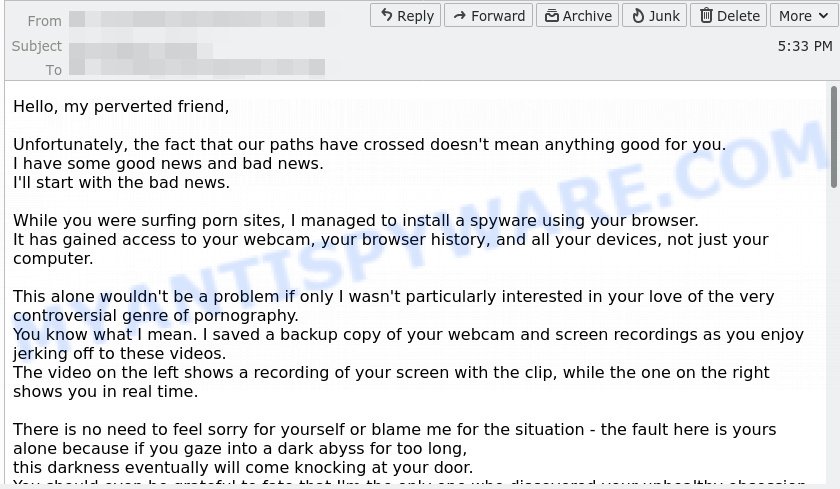
The “Low balance alert” Email Scam leverages fear and shame to coerce victims into complying. It’s essential to understand that responding to or paying the scammers does not ensure your safety; it merely signals to them that you’re a potential target for future exploitation. Always approach such alarming emails with skepticism, refusing to pay or provide personal information. Ensure your online security is robust with up-to-date software and be cautious about the links you click on. Awareness and critical thinking are crucial in protecting yourself against these types of online scams.
Table of Contents
🚨 Is the “Low Balance Alert” Email a Scam?
Yes, the email with the subject “Low Balance Alert” claiming to have compromising information about you is definitely a scam. 🚫 If you’ve received an email threatening to release videos of you visiting controversial websites unless you pay a ransom, be very cautious. These threats are made-up and designed to exploit your fears to coerce you into paying money.
Here’s what the email said:
Hello, my perverted friend,
Unfortunately, the fact that our paths have crossed doesn’t mean anything good for you.
I have some good news and bad news.
I’ll start with the bad news.While you were surfing porn sites, I managed to install a spyware using your browser.
It has gained access to your webcam, your browser history, and all your devices, not just your computer.This alone wouldn’t be a problem if only I wasn’t particularly interested in your love of the very controversial genre of pornography.
You know what I mean. I saved a backup copy of your webcam and screen recordings as you enjoy jerking off to these videos.
The video on the left shows a recording of your screen with the clip, while the one on the right shows you in real time.There is no need to feel sorry for yourself or blame me for the situation – the fault here is yours alone because if you gaze into a dark abyss for too long,
this darkness eventually will come knocking at your door.
You should even be grateful to fate that I’m the only one who discovered your unhealthy obsession and not your friends, family and colleagues.And this is where I get to the essence of my message – I can easily organize this. Everyone you know, love and cherish,
everyone you’ve spent years building your reputation as a respectable and honorable person in front of,
will get a copy of the video of you self-pleasing yourself while watching these controversial videos.All of your email and messengers contacts will get these videos at the same time.
You will have nothing left but to move to another city, and perhaps even another country, to get rid of the sick guy trail that will be running behind you.
However, this also might not help. As they say, the Internet remembers everything.
There’s a good chance you will have to deal with the consequences for the rest of your life, despite your efforts to clear your name.Now, as I promised, the good news.
I have a win-win solution for both you and me.
You regain your old free life and I make a small profit.You should transfer $1250 to my Bitcoin wallet: 1FECxHyNFvYjj7FVQtmD1GrMxoLEBFHDCV
If you are unfamiliar with cryptocurrency, it’s simple.
Type “crypto exchange” into the search engine and choose the option that suits you.
You can think of me as a kind of your life coach because if I didn’t show up in your life,
you would continue to lead the same destructive lifestyle as before.
So I kind of did you a favor, and favors are never free.I must warn you not to do something stupid that you might do due to your lack of experience, such as:
& Contacting law enforcement.
I’m untraceable anyway, because cryptocurrencies are anonymous and I have access to all your devices,
so as soon as I notice you trying to do something like this, the compromising clips will be made public.
& Negotiating with me by responding to this letter. My demands are ultimatums.
I generated this letter using your own email client, therefore it is impossible to contact me!
& Resetting, reinstalling your system or destroying your devices won’t help you.
I repeat: I have access to them and if I notice such activity, hasta la vista, baby.I wish you all the best and especially get rid of your “interesting” habits.
Then you will not only no longer encounter people like me, but you will also be able to reach a new quality level in your self-development.Bye!
P.S. A little friendly advice: from now on, take what you do online more seriously.
Examples of claims made in the scam email:
- While you were browsing adult websites, I installed spyware through your browser.
- I have access to your webcam, browser history, and all your devices, recording a video of you.
- You must transfer $1250 USD in Bitcoin to my wallet to prevent the sharing of these videos.
- Do not try to contact the police or mess with your devices, as it will lead to the immediate sharing of the videos.
- This message was sent using your own email client, making it impossible to reply to me.
The email uses intimidation and threats to create a sense of urgency and fear. 🚨 The goal? To trick you into sending money to the scammer without any genuine evidence that the claimed videos or information exist. These scammers exploit the potential embarrassment and panic of their victims to achieve their aims.
🚩 Red Flags to Watch Out For:
Stay alert and question the legitimacy of such emails if you notice these signs. 🔍🛡️
- 📧 Intimidating Content: Emails that use fear and claim to have compromising videos or information about you.
- 🔗 Demands for Cryptocurrency: The scammer requests payment in Bitcoin, taking advantage of its anonymity.
- ⏳ Urgency and Deadlines: The email imposes a quick deadline to pressure you into acting out of fear.
- 🖼️ Claims of Spyware: Be skeptical of emails claiming to have installed spyware on your devices without showing any real proof.
- ✍️ Language of Extortion: These emails often include direct threats to share private videos or information with everyone you know.
- 👤 Anonymity of the Sender: Scammers typically use temporary or difficult-to-trace email addresses to remain anonymous.
- 🔄 No Real Evidence Provided: Genuine allegations would probably include some form of evidence, but scammers rely solely on intimidation without substantiating their claims.
🕵️♂️ How the “Hello, my perverted friend” Email Scam Works
The “Hello, my perverted friend” email scam, often with alarming subjects like “Low balance alert”, is a form of digital blackmail. It’s important to understand the tactics it uses to protect yourself from falling victim to it. 💡🔐
🚨 Exploitation of Fear and Shame
This scam starts with an email accusing the recipient of visiting adult websites, exploiting the emotions of fear and shame to pressure the recipient into complying with the scammer’s demands without questioning the legitimacy of the accusations.
🔗 False Claims of Spyware Infection
The scammer falsely claims that spyware has been installed on the recipient’s device during their visit to adult websites. This non-existent spyware is alleged to give the scammer access to sensitive information and the ability to monitor the victim’s activities, including capturing video through the webcam.
False Claims Examples:
- Installation of spyware on all your devices
- Access to webcams, browser history, and all connected devices
- Saved recordings of your screen and webcam during private moments
- Threats to distribute these recordings to your contacts
🎭 Fabricated Evidence and Ultimatums
Scammers claim to have recorded videos of the victim in private moments to create a sense of urgency. They issue an ultimatum, demanding a ransom in cryptocurrency within a specified timeframe to avoid distribution of the supposed recordings.
📥 Demands for Cryptocurrency Payment
The scammer demands payment, typically in Bitcoin, to allegedly delete the recordings and remove the non-existent spyware. Cryptocurrency is chosen for its perceived anonymity, making it challenging to trace the scammer.
🔄 Illusion of Control and Anonymity
The scammer pretends to have complete control over the victim’s devices and to be untraceable, using cryptocurrency and claiming to have advanced hacking capabilities.
🕳️ Threats and Psychological Manipulation
The email includes threats to share the alleged recordings with the victim’s contacts, along with a false promise of deleting the recordings in exchange for money. This manipulation is designed to make the victim act out of fear and desperation, hoping to protect their reputation.
Examples of such scams
Scammers have developed a variety of tactics to intimidate and exploit unsuspecting individuals. Here are a few common examples:
💼 I am a professional hacker EMAIL SCAM
Posing as a hacker, the sender of this email might say they’ve infiltrated your system. They may even claim they have proof of embarrassing activity and will publish it unless you send them money. Remember, a real hacker wouldn’t announce their presence—it’s a tactic to pressure you into paying.
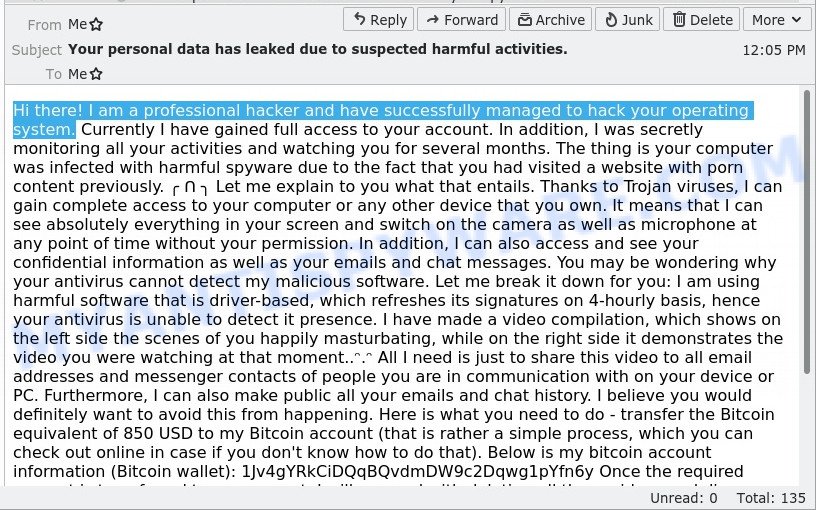
🔒 Your Private Information has been Stolen Email Scam
Here, the scammer will claim they’ve stolen sensitive information from you and threaten to release it unless you pay a ransom. They rely on the scare factor, hoping you’ll pay to protect your reputation, even though they likely have no data at all.
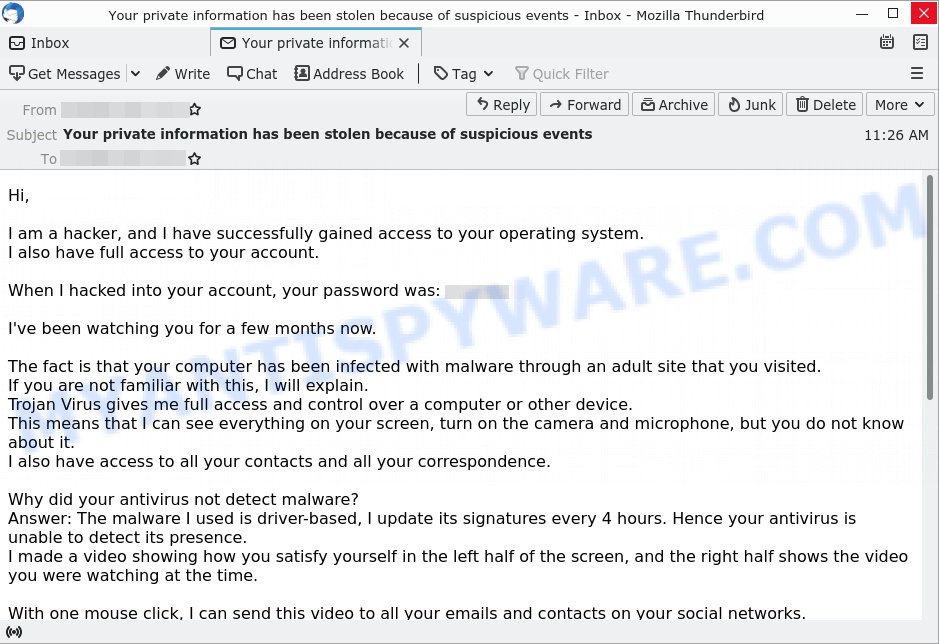
📹 I RECORDED YOU Email Scam
In this scam, the sender claims to have control over your camera and alleges they have recorded you during private moments. They typically demand payment to keep the footage private. Beware: this is a bluff to get you to pay up out of fear.
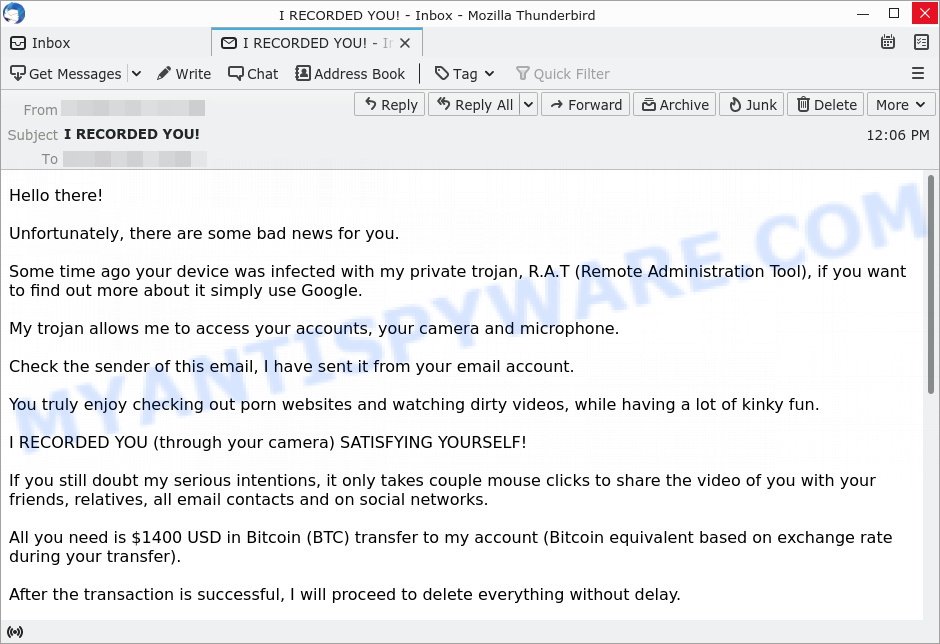
Each of these scams plays on fear and urgency to trick you into acting against your best interest. Always approach such emails with skepticism, verify your security, and do not engage with the scammers.
Should you pay?
No, you should not pay the ransom demanded by the scammer. Remember that this is a scam and paying the ransom will only encourage the scammer to continue their criminal activities! Additionally, paying the ransom can make you a target for future scams. It is important to stay vigilant and protect your personal information from such scams by using strong and unique passwords, enabling two-factor authentication, and regularly updating your computer’s security software. If you receive such an email, it is best to report it to the authorities and your email provider.
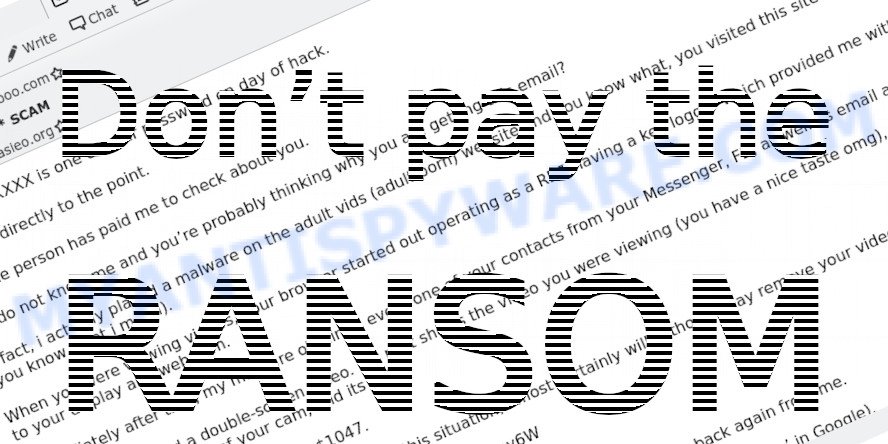
What to Do if You Receive the Email
Receiving the “Hello, my perverted friend” email can be deeply unsettling, but with the right steps, you can ensure safety and peace of mind.

Here’s a specific guide on handling this scam:
Begin by reminding yourself to stay calm. The email is crafted to elicit panic, pushing recipients into rash decisions. Recognize its true nature—a manipulative attempt to exploit fear.
Resist any impulses to pay. Even if you’re tempted to make the problem go away, understand that payment doesn’t guarantee safety. It merely emboldens the scammer, possibly marking you as an easy target for future deceptions.
Do not engage with the scammer. Replying or trying to open a dialogue can inadvertently give away more information, or signal that your email is active, making you a prime candidate for further scams.
Seeing a familiar password can be particularly jarring. If the scam email mentions a password you recognize, it’s essential to check its source. Use services like haveibeenpwned.com to see if your email or credentials have been compromised in any past data breaches.
Subsequent to that, update your passwords. Always choose strong, unique combinations and activate two-factor authentication on platforms that support it.
As a precaution, run a comprehensive security scan on your device. While the scam email’s claims about malware are usually baseless, this step ensures your system remains clean and threat-free.
Report the email to relevant authorities (e.g., FTC). Sharing details with your local law enforcement or cybercrime units can contribute to ongoing investigations and aid in the crackdown on such malicious activities.
Lastly, spread awareness. Inform friends, colleagues, and family about the scam, equipping them with the knowledge to recognize and sidestep such threats. Knowledge, shared and acted upon, diminishes the effectiveness of these scams, making the digital world a bit safer for everyone.
Threat Summary
| Name | ‘Hello, my perverted friend’ Email Scam, ‘I have some good news and bad news’ Email Scam |
| Type | Phishing/Sextortion |
| Email Subject | ‘Low Balance Alert’, ‘A short discussion about your actions’, ‘Familiarize yourself with the factual points of your case’. |
| Ransom amount | $1250, $1490, $1340 USD (in Bitcoin equivalent) |
| Bitcoin Address | 17aB5wwDJ6EGdzzMgp3Y5deKCrqe7ga3qR, 1FECxHyNFvYjj7FVQtmD1GrMxoLEBFHDCV, 1JmAEwSa4xHxQTVEChaF9Gs7cSNZVQMx22 |
| Fake Claims | Compromised data, webcam access, malware/backdoor installed |
| Damage | Psychological distress, potential financial loss if ransom is paid |
| Distribution | Mass emailing, likely from a purchased or hacked email list |
| Tactics | Fear induction, urgency, deception |
| Variations | Different ransom amounts, varying email content, alternative cryptocurrencies for payment |
| Prevention Tips | Use strong, unique passwords; enable two-factor authentication; be skeptical of unsolicited emails; never pay ransoms |
| Reporting Info | Forward to the Anti-Phishing Working Group at reportphishing@apwg.org; Report the scam to relevant authorities (e.g., FTC); Share information about the scam with friends and family to raise awareness; Monitor online accounts for any suspicious activity |
Conclusion
The email with the subject “Low balance alert” claiming to have installed spyware while you were visiting adult websites and possessing compromising videos is a scam designed to extort money from its victims. Scammers employ intimidation tactics, falsely asserting they’ve accessed your webcam, browser history, and all your devices, threatening to share these non-existent recordings with your contacts unless you pay a ransom, typically requested in Bitcoin due to its difficult-to-trace nature. It’s important to recognize that these allegations are nearly always baseless.
Bottom Line: Do not engage with these emails. The best approach is to disregard their threats and take steps to strengthen your online security. 🛡️💻
Stay vigilant and use sound judgment; an email that seeks to provoke fear or seems overly menacing is almost certainly a scam. 🤔
















I’ve just received one of those. Thank you for your tips, that was very helpful.
I suspect it’s related to Filejoker. if everyone who got this mail and made subscription to Filejoker, it’s really them!
Hello friends, I recently received an email like that, but instead of feeling threatened, I decided to look for something that could allow them to do what they really said and prevent me, well, I found a name and a cell phone number. which would theoretically be linked to the scammer but I’m not sure if it’s the scammer himself or a random person he used as a mask. Basically what we discovered was that he is from Peru and goes by the name José chayana burgos, this is information that I managed to find regarding the email sent, but I’m not sure if this is actually who hacked our accounts.